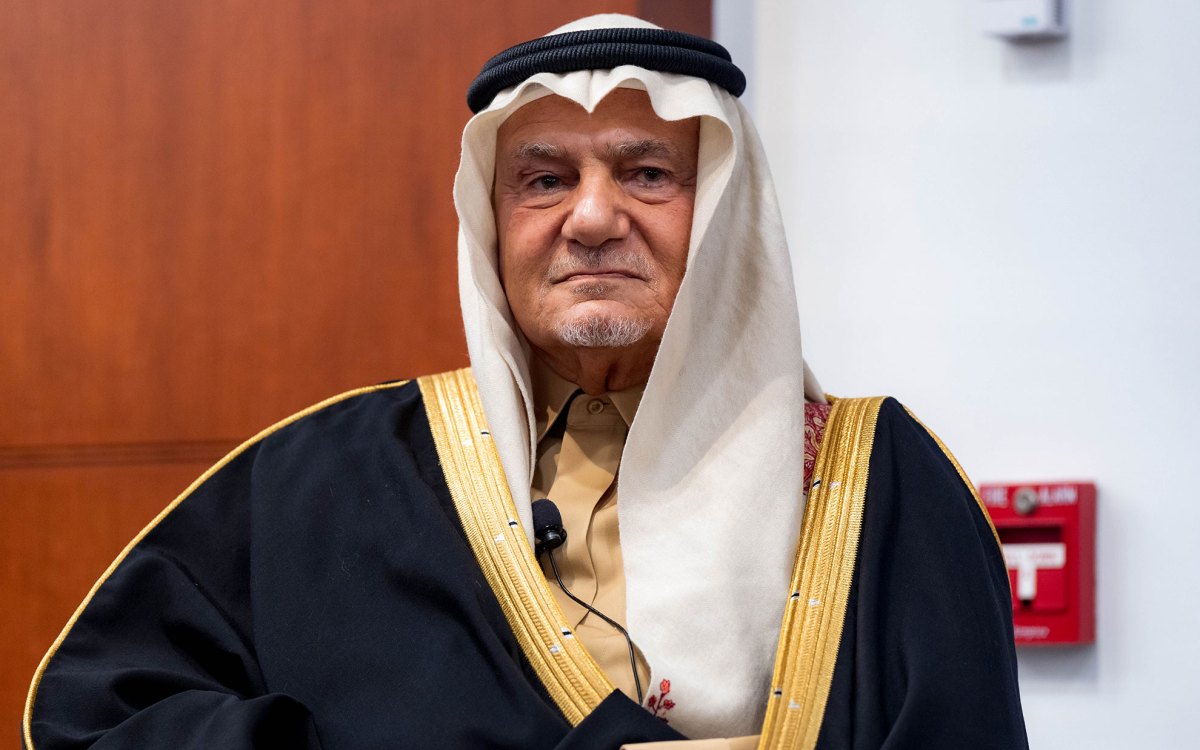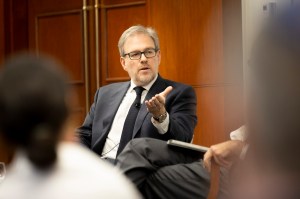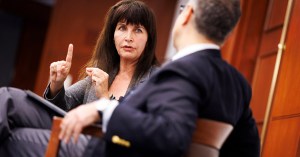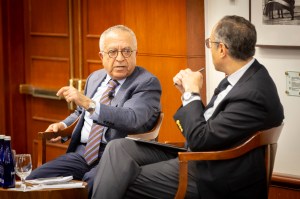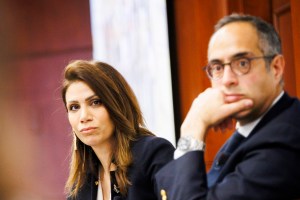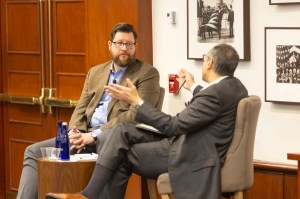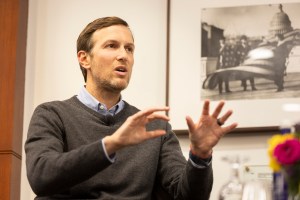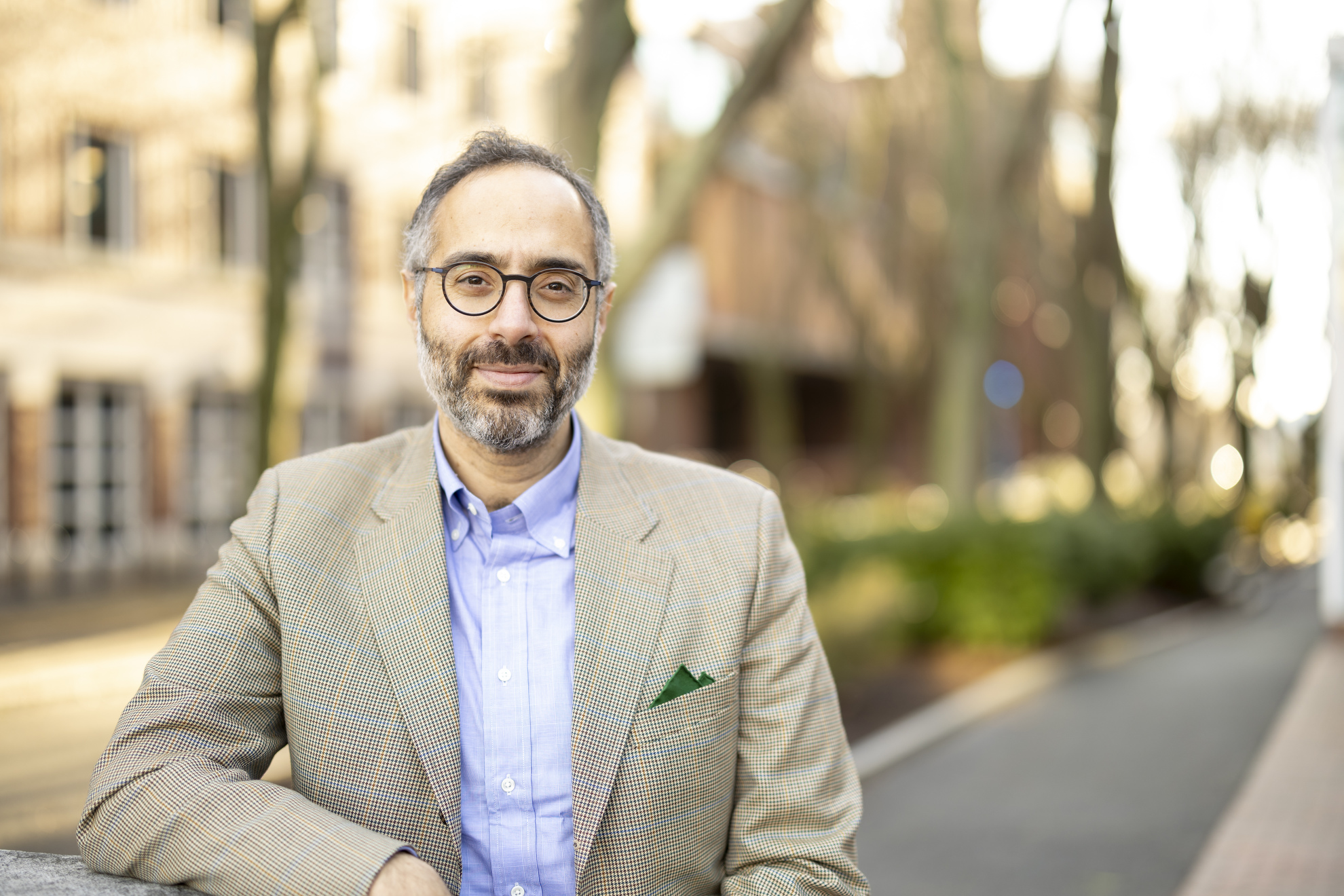
Niles Singer/Harvard Staff Photographer
Stepping into the hot center
Tarek Masoud’s ‘Middle East Dialogues’ sparked many conversations — including about importance of having them
Part of a series of profiles focused on community-led efforts to promote dialogue across campus.
A week after the Oct. 7, 2023, Hamas-led attacks on Israel, Middle East expert Tarek Masoud led a well-attended forum with policymakers and scholars on the causes of the war and what might happen next in the conflict-ridden region.
Masoud, faculty director of the Middle East Initiative at Harvard Kennedy School, thought he was doing his part to educate and promote civil discourse on a divisive topic. A few weeks later, however, an HKS student complained in a Boston Globe op-ed piece that Harvard needed to do more to teach her about the Israeli-Palestinian conflict. Masoud was hearing similar complaints around campus and was taken aback.
“My first thought was to be very angry because I had been working hard to provide learning opportunities for our community on this issue,” said Masoud, Ford Foundation Professor of Democracy and Governance. “But I later concluded that there was a deeper truth to what the student was saying, that in fact we hadn’t fully engaged in a real debate about this very thorny issue.”
In response Masoud launched the “Middle East Dialogues” series last spring to hold conversations between people from across the political spectrum of the Israel-Palestine conflict. Masoud wanted the events to explore the historical, political, religious, and cultural complexities of what was going on. But he also wanted to model how to have hard conversations about hard topics on campus.
“Every single one of these speakers was being brought here not to be, quote-unquote, platformed or praised, but to be interrogated.”
“What students are really hungry for is to hear the most important arguments on either side,” said Masoud. “And instead of putting the speakers on panels, I was going to sit with them one on one and really probe their arguments. I wanted to create a space for us to give full voice to the debate.”
And debate there was. The discussions drew accolades and criticism, with some of the harshest rebukes directed at Massoud for inviting Jared Kushner ’03, President Trump’s son-in-law and former Mideast adviser, and Dalal Saeb Iriqat, Arab American University Palestine professor of diplomacy and conflict resolution, as guest speakers. Some objected to Kushner’s lack of credentials, and others blasted Iriqat for her controversial comments on X, which described the Oct. 7 terror attack as a “normal struggle for freedom.”
In hindsight, Masoud said had he seen Iriqat’s posts beforehand he might not have invited her. The pushback against her visit included hate mail addressed to him and calls to cancel the event. But he ultimately decided to go ahead, noting her views represent those of a significant contingent of others around the world and so should be aired and closely examined.
“Every single one of these speakers was being brought here not to be, quote-unquote, platformed or praised, but to be interrogated,” said Masoud. “We have all kinds of visiting dignitaries and powerful people who come through Harvard, and oftentimes we just celebrate them and celebrate our proximity to them. That’s never what we should do. We should be civil and respectful and even friendly, but also relentless in holding their feet to the fire.”
The entire Dialogues project was a testament to Masoud’s belief in free inquiry and intellectual diversity, according to Derek Penslar, William Lee Frost Professor of Jewish History and director of the Center for Jewish Studies.
“Tarek’s speaker series on Israel/Palestine has done exactly what Harvard needs at this time — bringing together public figures and experts representing different views, fostering lively exchange and respectful disagreement, and not shying away from difficult issues,” Penslar wrote in an email. “Tarek’s intellect, energy, and kindness are inspiring.”
Students want to hear alternative points of view, and faculty and administrators should provide them with opportunities to hear a variety of perspectives, Masoud said.
“The majority of our students are earnest seekers of the truth,” said Masoud. “The fact of the matter is that it’s our responsibility to our students to not do the easy thing, which is to tamp down anything that’s disagreeable. There’s this old American dictum that says that you shouldn’t talk about politics or religion at the dinner table. Well, if you say we shouldn’t talk about politics or religion at Harvard, you might as well close Harvard.”
Masoud plans to continue with the Dialogues in the spring, but he’s broadening it to other hot topics such as the competition between various Arab countries and Iran, the power race between the U.S. and China, and U.S. foreign policy in the Middle East.
“In an intellectual environment like this, that’s full of very high-powered, highly intelligent people who are all trying to make a difference in the world, you’re going to have a lot of contested ideas, a lot of debate, a lot of argument,” said Masoud. “Talking about these things does not make us happy, but these hard conversations have the potential to increase human happiness if they get us closer to the truth and closer to solutions to these very hard problems.”



